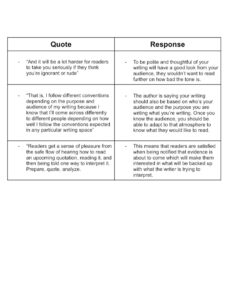Author: Darien Vazquez (Page 1 of 9)
I learned from reading Kyle Stedman’s article that you have to be very mindful of how you use your sources because if it’s not used carefully, it may be difficult to read for your audience which may lead to them getting annoying. I newly learned that quotations play a big role in expressing what you’re trying to explain in your reading, being that it is backing up your information. If you just put the quote down without even showing any relevancy to why it is being brought up making it sort of random, it won’t really go together and will leave you questioning if you used the source the right away. A question I have is will it be necessary for some aspects to put the page number or paragraph after a quotation to make it more precise? I feel some readers will find that verification unnecessary if they don’t even care to go to the exact place that the source is.
In Unit 2, one of my quotes used in my annotated bibliography has the chapter and page number attached to it. It states [Chapter 1: The Key Benefits of Choice, page 17 it states “Choice may be one of the best vehicles for getting there, for it allows teachers and students to share in the responsibility of teaching and learning……]. This sourcing strategy creates a vivid description of where exactly my information came from and how valuable it is to my information. I want to be that writer that wouldn’t want to lose an inch of interest to my audience, making sure they’re on the same page as me when reading my thoughtful information. This source was very efficient to use because it gave more detail for the particular information given the whole time, how it explains the problem of limiting student’s choices in the classroom and how that happening will be effective in the learning environment for teachers and students together. The author that wrote this book was a great source that allowed to further hook my audience into siding with my topic, reading something like that would definitely have you more involved in reading more without any thought of annoyance.
I want to teach my audience the advantages of expanding student’s freedom in the classroom and how allowing them to chose what they want to learn and focus on will make their learning more exciting and helpful. The most important thing I learned that I want to teach is how a change like this will make education extremely joyful so students won’t have to be bored with what classes usually consists of, as well as the fact that switching up usual things can make things more exciting especially in the classroom. My target audience is mainly the government because they control mainly everything in society and make things active, they are the head officials when it comes to the education system so to get the word out to them will definitely put us forward into reform in our education. The genre I plan to write this in a non-written document like an interview or an article depending on how the process goes, I feel this genre is the most realistic and beneficial for the audience to be in favor of with hearing how the real world feels about letting students having a say of their learning. I plan to get started by introducing my topic the best way to get the audience’s attention to already get them interested in what they’re about to encounter when reading my writing, maybe with a statistic or a theoretical question. I would be worried about my genre not working out while I’m already working on my writing, life if I have second-guesses about my topic or genre maybe wanting to change it or even writing something over I don’t feel makes sense. My concerns on finishing this project is will it exceed my expectations and what I planned in the first place? Or will this impress my target audience so it can help my writing complete its purpose for change?





Recent Comments